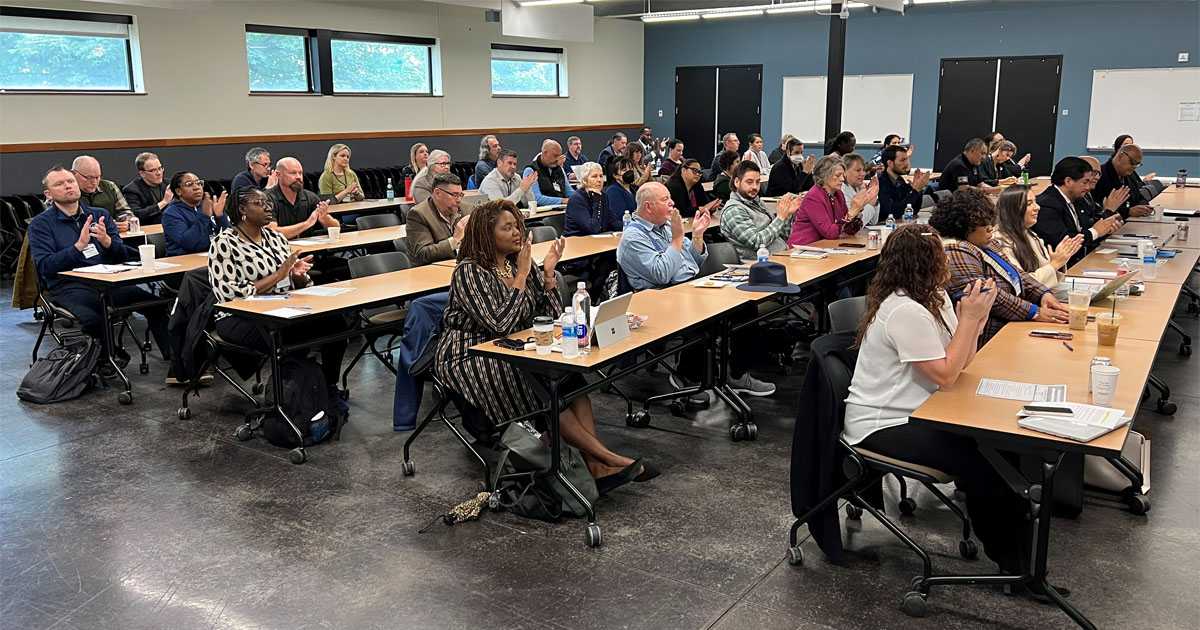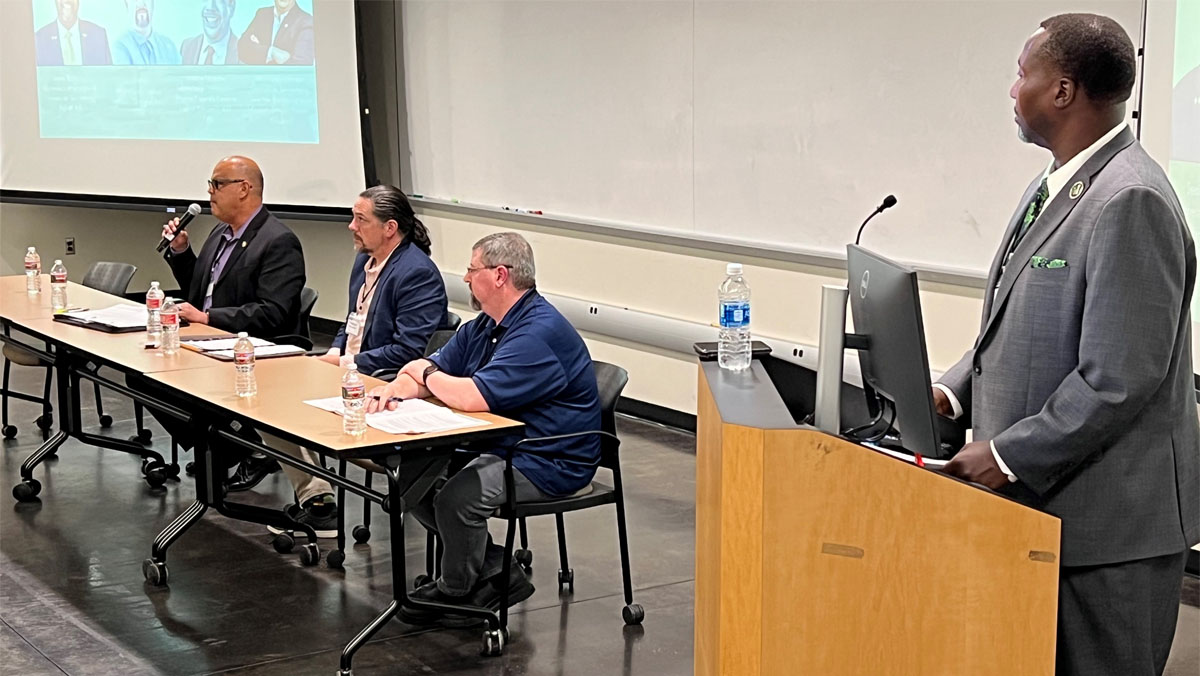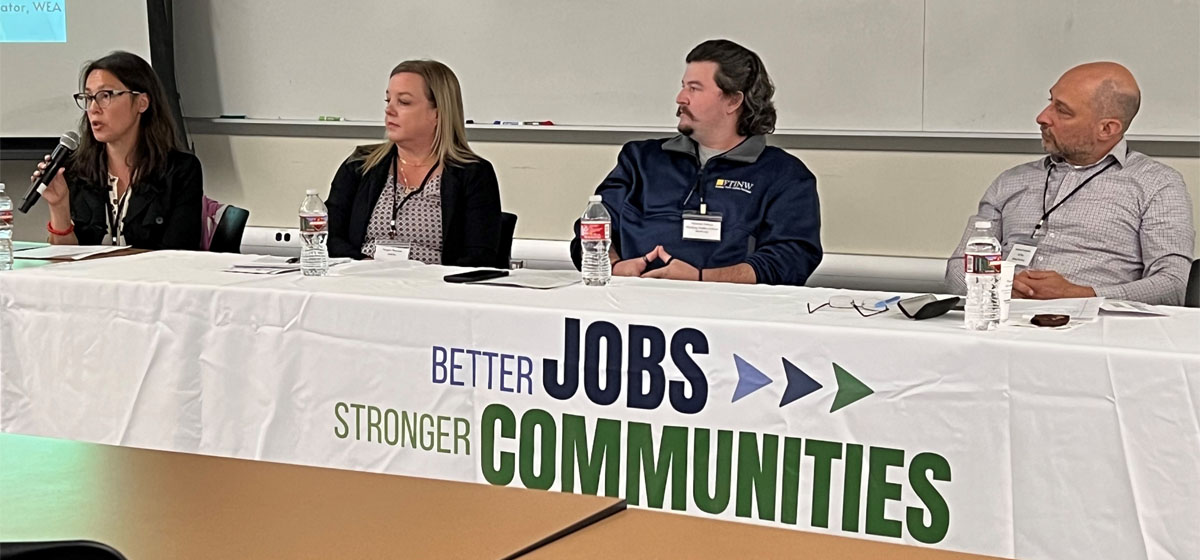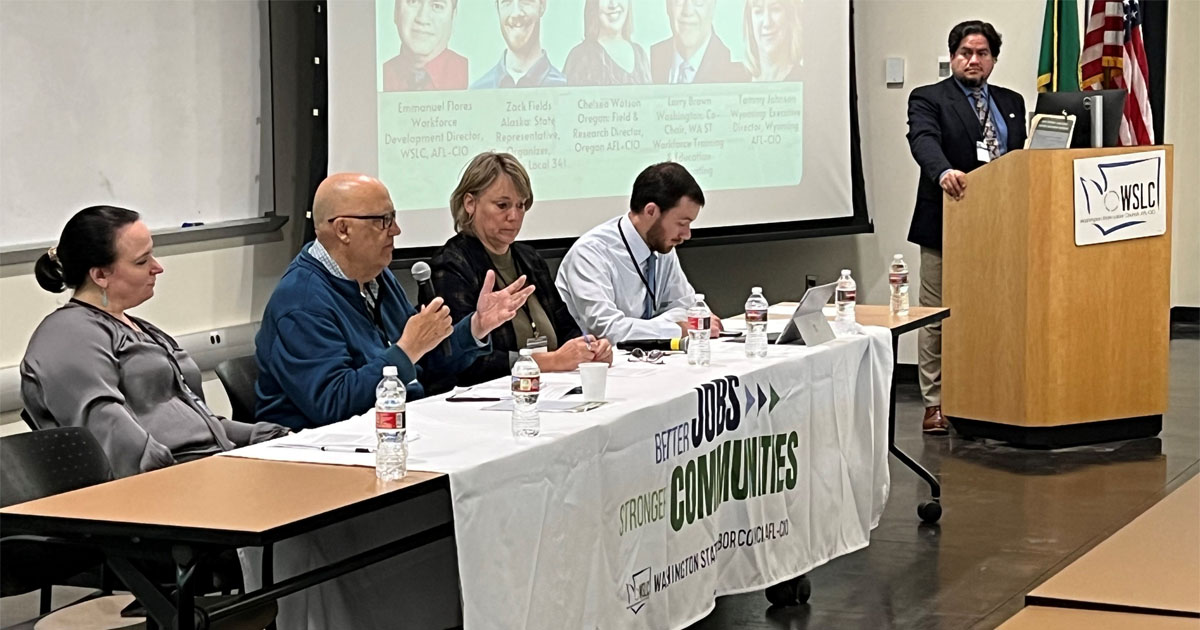W.S.L.C.
Opening doors to union careers, security
Conference touts workforce development as key to labor’s growth, future
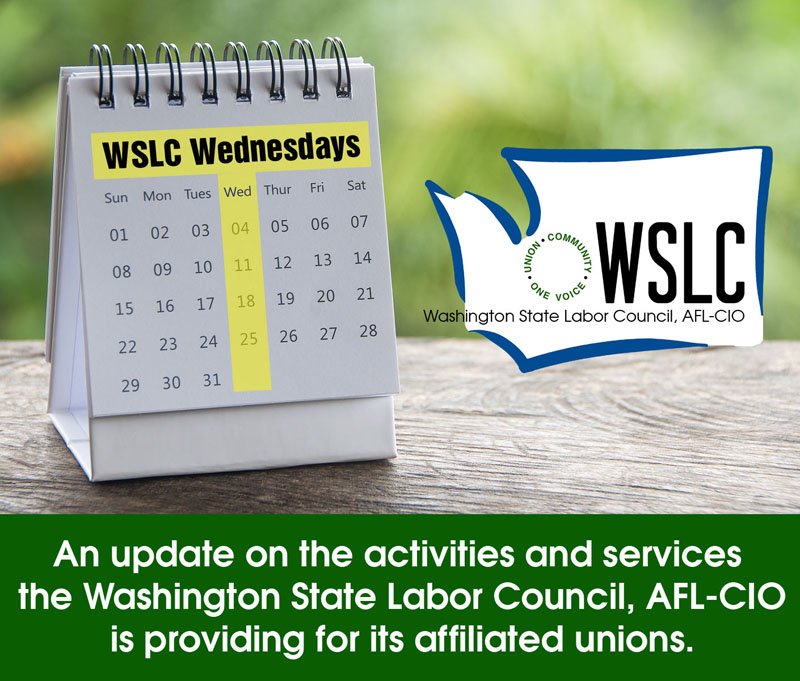 SEATTLE (Oct. 4, 2023) — At a time that unions are surging in popularity and aggressively fighting to win better wages and working conditions, we need to seize this opportunity to grow the labor movement. And that starts with making sure more workers have the chance to get the skills and knowledge they need to succeed at good union jobs.
SEATTLE (Oct. 4, 2023) — At a time that unions are surging in popularity and aggressively fighting to win better wages and working conditions, we need to seize this opportunity to grow the labor movement. And that starts with making sure more workers have the chance to get the skills and knowledge they need to succeed at good union jobs.
This was a recurring theme at the Pacific Northwest Labor Leader Workforce Development Conference hosted by the Washington State Labor Council, AFL-CIO on Oct. 2-3 at the South Seattle College. Apprenticeship and training professionals from Oregon, Alaska, Wyoming and throughout Washington state gathered to learn from each other’s best practices and share ideas and information.
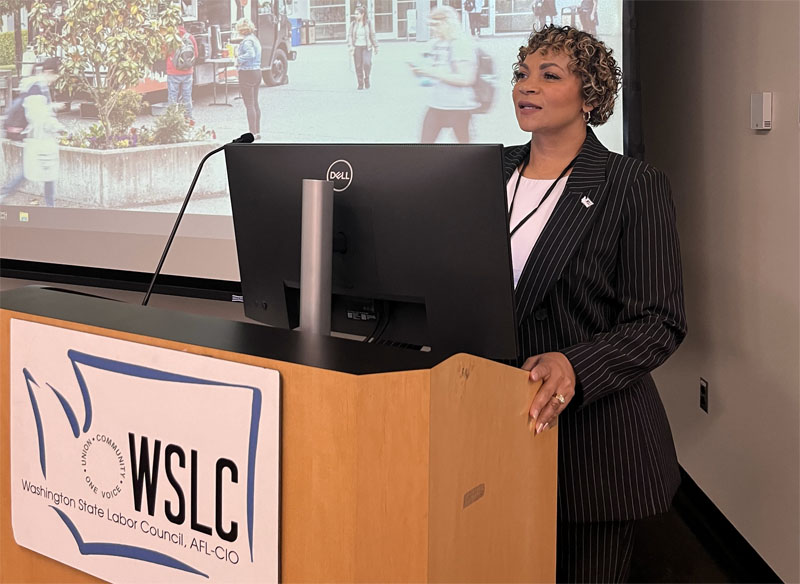 “I believe that registered apprenticeship programs are a big reason why unions now enjoy some of highest approval ratings in a generation,” said WSLC President April Sims in her opening remarks. “Every apprentice who completes their program – whether it’s in the building trades, at the Machinists Institute, in health care, or some other non-traditional apprenticeship – emerges as an ambassador for the labor movement.”
“I believe that registered apprenticeship programs are a big reason why unions now enjoy some of highest approval ratings in a generation,” said WSLC President April Sims in her opening remarks. “Every apprentice who completes their program – whether it’s in the building trades, at the Machinists Institute, in health care, or some other non-traditional apprenticeship – emerges as an ambassador for the labor movement.”
She added:
“The best possible advertisement for unions is when our members are succeeding. When they earn good wages and family-supporting benefits, when they are safe at work, when they have stable work because their skills are in demand, when they have a pension or other retirement benefits… they are living billboards for our labor movement.”
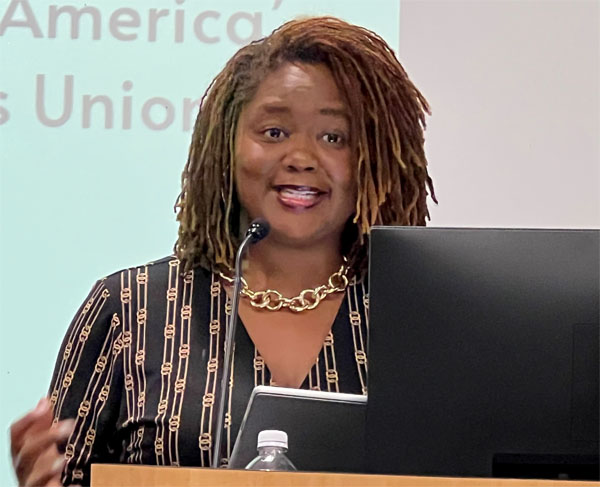 Melissa Wells, Special Assistant to the President of the North America’s Building Trades Unions (NABTU), was the keynote speaker and reminded all that the labor movement has deliberately chosen to invest in training and apprenticeship. Unions don’t just bargain for better wages and benefits for existing members, they bargain to lift up the next generation of members.
Melissa Wells, Special Assistant to the President of the North America’s Building Trades Unions (NABTU), was the keynote speaker and reminded all that the labor movement has deliberately chosen to invest in training and apprenticeship. Unions don’t just bargain for better wages and benefits for existing members, they bargain to lift up the next generation of members.
“Let it be known that we invest $2 billion from collective bargaining within our contracts with signatory employers each year into training,” Wells said. “That $2 billion investment is in our workers and our (apprenticeship) system, and that is something we are proud of. That’s how we are able to advance this golden model of a high-skill, diverse workforce.”
The conference featured multiple panels of issue-experts who answered questions from participants, including:
Defining “Quality Jobs” — Working people know the value of a good job that provides stability for themselves and their families. And folks in workforce development know that quality jobs are the foundation of an equitable economy. But we need to quantify what makes a good job so we can insist that major public investments, like the new federal infrastructure spending, create them.
This panel (from the right in the photo above) was moderated by IBEW 46 Business Manager Sean Bagsby, and featured Josh Hall of the Oregon AFL-CIO, Nathe Lawver of the Pierce County Central Labor Council, and Monty Anderson of the Seattle Building and Construction Trades Council.
Growing Registered Apprenticeships — This panel was a deep dive into both traditional and new emerging registered apprenticeships, and how they can grow if apprentices are provided wrap-around support. It featured (from left) Sally McNair of the Washington Education Association, Megan Pearson of ANEW, Mitchell Forhan of the Finishing Trades Institute Northwest, and Andy Friedman of the United We Heal Training Trust and Provider Services Fund (AFSCME). It was moderated by Ligaya Domingo of SEIU Healthcare 1199NW.
When the panelists were asked to share success stories from their programs, Forhan said his success story was personal. He said that because of his own successful apprenticeship experience, “I went from someone who would probably be doing stupid stuff on the street to being here with you today.”
Do you want to “earn while you learn” a family-wage career in the trades? Check out the Construct a Career website from the Washington State Building and Construction Trades Council about how to get started in a union apprenticeship program today!
A State-by-State Look at Workforce Systems — This panel explained the unique features of multiple states’ workforce development systems, what labor’s roles are in each state, and why it’s important to get equal standing with business interests on these boards. It featured (from left) Chelsea Watson of the Oregon AFL-CIO, “Landslide” Larry Brown of the Washington State Workforce Training and Education Coordinating Board (and past WSLC president), Tammy Johnson of the Wyoming AFL-CIO, and Alaska state Rep. Zack Fields of LIUNA Local 341.
Additional panels and group discussions were conducted on expanding community outreach for union apprenticeship and training programs, and leveraging grant funding as opportunities to advance labor values in workforce development.
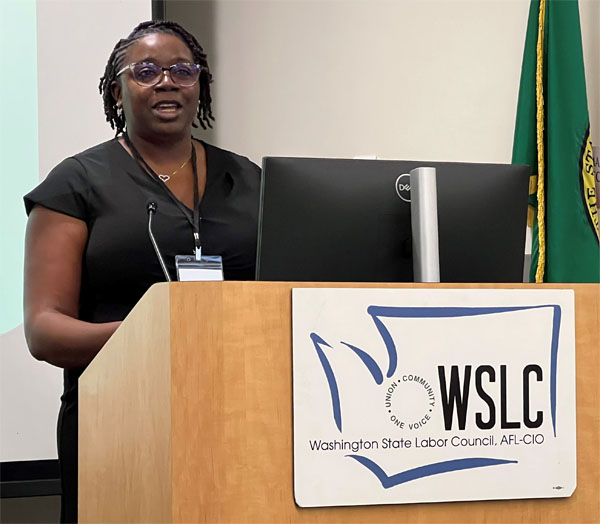 Kim Cosby, Strategic Policy Advisor for the AFL-CIO’s Working for America Institute delivered an update on what’s happening nationally with the Biden Administration’s historic infrastructure investments and other federal funding for programs that support training, retraining, education, and apprenticeship.
Kim Cosby, Strategic Policy Advisor for the AFL-CIO’s Working for America Institute delivered an update on what’s happening nationally with the Biden Administration’s historic infrastructure investments and other federal funding for programs that support training, retraining, education, and apprenticeship.
Conference participants also heard from Muhammad Javid of the Washington State Labor Education and Research Center, Rebekah Whittaker of Oregon LERC, and Rachel Erstad of UW’s Harry Bridges Center for Labor Studies about the latest research and ideas for addressing equity in workforce development.
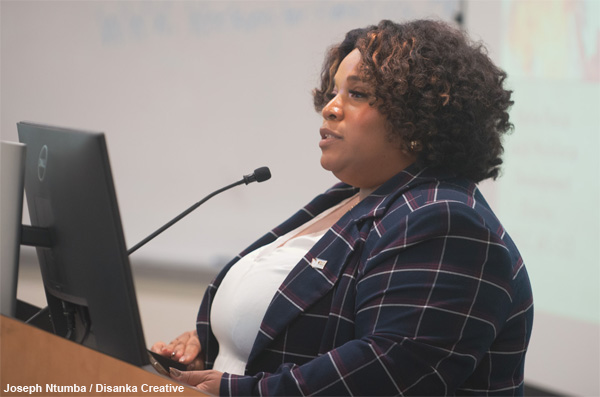 “I hope we can all take what we’ve learned these past two days back to our organizations with a fresh sense of pride and purpose,” said WSLC Secretary Treasurer Cherika Carter in her closing remarks. “We are all part of something special right now. Unions are leading the way and offering solutions to the folks who are frustrated in low-wage dead-end jobs. We need to seize every opportunity to open our doors even wider and invite more working people into our movement.”
“I hope we can all take what we’ve learned these past two days back to our organizations with a fresh sense of pride and purpose,” said WSLC Secretary Treasurer Cherika Carter in her closing remarks. “We are all part of something special right now. Unions are leading the way and offering solutions to the folks who are frustrated in low-wage dead-end jobs. We need to seize every opportunity to open our doors even wider and invite more working people into our movement.”
WSLC Wednesdays is a feature of The Stand where different departments of the Washington State Labor Council, AFL-CIO describe their recent activities and the services they are providing to WSLC-affiliated unions.

